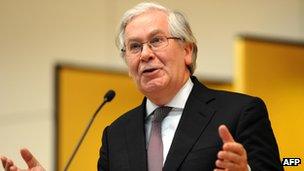Bank of England rejects more stimulus
- Published

In February, the Bank of England governor voted to expand the quantitative easing programme
The Bank of England's rate-setting committee has kept interest rates at 0.5% and rejected calls to inject more stimulus into the economy.
The decision means the Monetary Policy Committee (MPC) has now kept rates at historic lows for four years.
There had been calls for the Bank to do more to support the economy and expand its quantitative easing (QE) programme.
BoE governor Sir Mervyn King voted to increase the QE programme at the MPC's last meeting.
He was among three MPC members who backed a £25bn increase in QE to £400bn, but was outvoted.
'Live issue'
Analysts suggested the nine-member committee was equally divided in the latest vote.
"A combination of mixed economic data and the MPC's recent tilt in a more dovish direction is likely to have made this decision a close call," said Stephen Gifford, the director of economics at the CBI, the business lobby group.
"With only a modest pick-up in growth expected, the possibility of further QE will remain a live issue."
The pound rose sharply in response to the bank's announcement, after earlier falling below $1.50 amid speculation more QE could be announced.
It jumped to $1.506 after the MPC's decision was announced.
Earlier another business group, the British Chambers of Commerce, said it expected to see an expansion to quantitative easing, but not until May.
The programme, which involves pumping new cash into the economy by buying government bonds, has instilled confidence among investors.
But some economists are worried that without further stimulus, the UK economy will continue to grow at its present sluggish pace.
More power?
GDP increased by just 0.2% last year, according to official figures, but the last three months of the year saw a contraction of 0.3%.
The poor performance of the economy has prompted calls for the Bank of England to take a more proactive role in encouraging economic growth.
Sir Mervyn will be replaced by the current governor of Canada's central bank, Mark Carney, in July.
Earlier the Financial Times reported that Chancellor George Osborne would use this month's Budget announcement to give the new governor more power to get the economy growing again.
The exact nature of the changes is not clear, but Mr Carney has previously spoken of broadening the bank's remit to include targeting economic growth.
Currently, the MPC's job is restricted to targeting 2% inflation.
Philip Shaw, chief economist at the investment bank Investec, said the Bank of England's monetary policy decisions were getting more difficult to predict.
But he also suggested the arrival of Mr Carney was already encouraging both the bank and the government to be more proactive in stimulating growth.
"The upshot is that the authorities seem ready to 'kitchen sink' the recovery," he wrote in an analysts note.